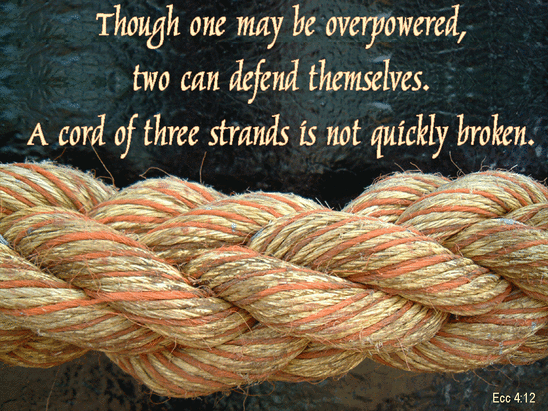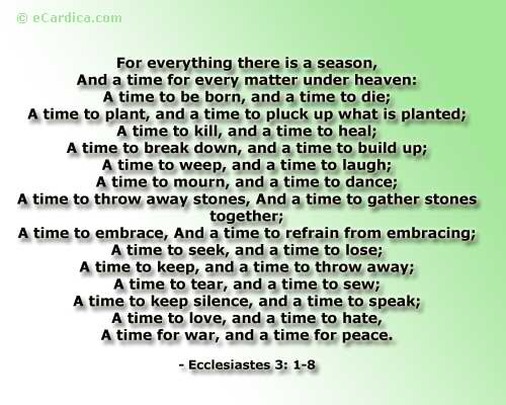The Book of Ecclesiastes

The writer's title ("Preacher") comes from a Hebrew root word related to "assembly" or "congregation." Perhaps the Preacher also held an office in the assembly. Septuagint word for "Preacher" is ecclesiastes, from which most English titles of the book are taken. No time period or writer's name is mentioned in the book, but several passages suggest that Solomon is the author. Life not centered on God is purposeless and meaningless. Without Him, nothing can satisfy (2:25). With Him, all of life and His other good gifts are to be gratefully received and used and enjoyed to the full (2:26; 11:8). The book contains the philosophical and theological reflections of an old man, most of whose life was meaningless because he himself had not relied on God.

The purpose of Ecclesiastes is to spare future generations the suffering the misery of seeking after foolish, meaningless, materialistic emptiness, and to
offer wisdom by discovering truth in seeking after God.
It appears that Solomon once again, wants to teach the reader wisdom, “I set my mind to seek and explore by wisdom concerning all that has been done under heaven. It is a grievous task which God has given to the sons of men to be afflicted with” (1:13).
offer wisdom by discovering truth in seeking after God.
It appears that Solomon once again, wants to teach the reader wisdom, “I set my mind to seek and explore by wisdom concerning all that has been done under heaven. It is a grievous task which God has given to the sons of men to be afflicted with” (1:13).

Chapters 6-8 are Solomon’s advise for having a meaningful life, “Consider the work of God, for who is able to straighten what He has bent?” (7:13).
In chapters 9-12, Solomon writes a conclusion that clears up the entire book, everyone will eventually dies and all the deeds of man are useless without God; our obedience must be to Him. "The conclusion, when all has been heard, is: Fear God and keep His commandments, because this applies to every person (12:13)."
Foreshadowing of Jesus
Vanities and the world's wealth
For all of the vanities described in the Book of Ecclesiastes, the answer is
Christ. God has placed the desire for eternity in our hearts (Ecclesiastes
3:11) and has provided the Way to eternal life through Christ (John 3:16). We are reminded that striving after the world’s wealth is not only vanity because it does not satisfy (Ecclesiastes 5:10), but even if we could attain it, without Christ we would lose our souls and what profit is there in that (Mark 8:36)? Ultimately, every disappointment and vanity described in Ecclesiastes has its remedy in Christ, the wisdom of God and the only true meaning to be found in life.
continue to Song of Solomon...

Chapter 1-2, deal with Solomon’s personal experiences throughout his life. He describes that everything he sought was selfish pleasure and meant nothing eternally. Generally, he speaks concerning the meaning of life, “I have seen
all the works which have been done under the sun, and behold, all is vanity and striving after the wind.”(1:14). Solomon, the man who God gave the most wisdom, sought after, researched and tried everything in an attempt to find lasting happiness, and came to this conclusion, “All that my eyes desired I did not refuse them. I did not withhold my heart from any pleasure, for my
heart was pleased because of all my labor and this was my reward for all my labor. Thus I considered all my activities which my hands had done and the labor which I had exerted, and behold all was vanity and striving after the wind and there was no profit under the sun.”(2:10-11).
all the works which have been done under the sun, and behold, all is vanity and striving after the wind.”(1:14). Solomon, the man who God gave the most wisdom, sought after, researched and tried everything in an attempt to find lasting happiness, and came to this conclusion, “All that my eyes desired I did not refuse them. I did not withhold my heart from any pleasure, for my
heart was pleased because of all my labor and this was my reward for all my labor. Thus I considered all my activities which my hands had done and the labor which I had exerted, and behold all was vanity and striving after the wind and there was no profit under the sun.”(2:10-11).

In chapters 3-5, Solomon gives common explanations and observations. One in particular is 5:15, “As he had come naked from his mother’s womb, so will he return’”, speaking of everyone who dies takes nothing with him; possessions, in the end, are ultimately useless. As tough as it is, our sinful nature naturally gravitates toward materialism.